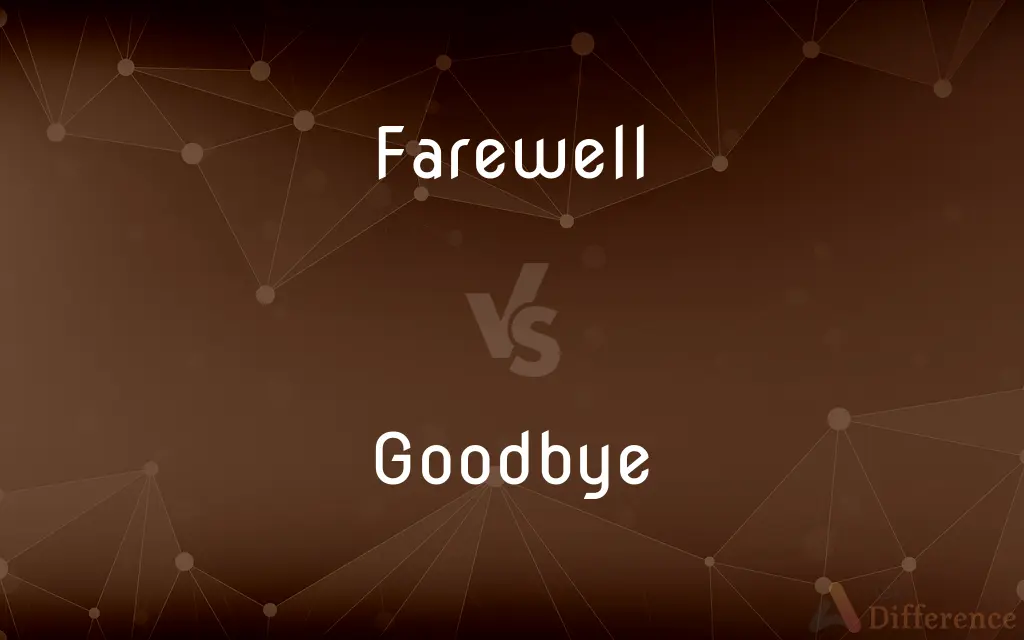Farewell vs. Goodbye — What's the Difference?
By Tayyaba Rehman — Updated on September 18, 2023
Farewell is a formal or emotional parting expression, often implying an extended or final separation; Goodbye is a general term used to express departure or parting.

Difference Between Farewell and Goodbye
Table of Contents
ADVERTISEMENT
Key Differences
Farewell and Goodbye are both expressions used when parting ways. However, Farewell carries a more formal or emotional weight, sometimes suggesting a longer or even permanent separation. Goodbye, on the other hand, is a standard and neutral term for departure that can be used in casual as well as formal settings.
In literature or cinematic contexts, Farewell might be used to emphasize the significance or emotion of a departure, making it appear more poignant. Goodbye, while still meaningful, does not inherently carry the same depth of emotion.
Another distinction lies in the situations they are often used in. Farewell parties or ceremonies are typically organized when someone is leaving for an extended period or for good. Saying Goodbye might occur at the end of a meeting, a phone call, or any temporary parting.
Linguistically, Farewell originates from the phrase "fare thee well," wishing someone well on their journey or endeavors. Goodbye has its roots in "God be with ye," shortened over time, which is more of a blessing than a mere parting expression.
It's also worth noting that while Goodbye is universally recognized and used, Farewell is sometimes seen as more dated or literary in certain contexts, though it remains a formal and eloquent choice for expressing good wishes upon parting.
ADVERTISEMENT
Comparison Chart
Connotation
Formal or emotional
Neutral, general
Usage
Longer or permanent separations
Any departure or parting
Origins
"Fare thee well" (wish well on journey)
"God be with ye" (a blessing)
Contexts
Literature, ceremonies, final departures
Daily interactions, phone calls, meetings
Frequency
Less frequent, more specific contexts
Commonly used, broader contexts
Compare with Definitions
Farewell
An acknowledgment or expression of goodwill at parting.
He bid farewell to his hometown before moving abroad.
Goodbye
A departure or leave-taking.
It was time for our final goodbye.
Farewell
An expression of good wishes upon parting.
She gave him a tearful farewell before his deployment.
Goodbye
A conclusion or end.
It's not a goodbye; it's a new beginning.
Farewell
A ceremony or occasion marking someone's departure.
The company organized a farewell for the retiring CEO.
Goodbye
An act of parting or dismissing.
With a brief goodbye, she left the room.
Farewell
A conclusion or ending.
The series finale served as a fitting farewell to the characters.
Goodbye
An expression used when parting.
I said goodbye and hung up the phone.
Farewell
Used to express goodbye.
Goodbye
A send-off or dismissal.
The teacher waved goodbye to her students.
Farewell
An acknowledgment at parting; a goodbye.
Goodbye
Used to express an acknowledgment of parting.
Farewell
The act of departing or taking leave.
Goodbye
An acknowledgment at parting, especially by saying "goodbye."
Farewell
A wish of happiness or safety at parting, especially a permanent departure
Goodbye
An act of parting or leave-taking
Many sad goodbyes.
Farewell
A departure; the act of leaving
Goodbye
; a formula used to another person or persons when the speaker, writer, or person addressed is departing.
Farewell
Parting, valedictory, final.
A farewell discourse;
The band's farewell tour
Goodbye
An utterance of goodbye, the wishing of farewell to someone.
They made their good-byes.
We have time for a short goodbye.
Farewell
Goodbye.
He said "Farewell!" and left.
Goodbye
To say goodbye; to wish somebody farewell on parting.
Farewell
To bid farewell or say goodbye.
Goodbye
A farewell remark;
They said their good-byes
Farewell
Go well; good-by; adieu; - originally applied to a person departing, but by custom now applied both to those who depart and those who remain. It is often separated by the pronoun; as, fare you well; and is sometimes used as an expression of separation only; as, farewell the year; farewell, ye sweet groves; that is, I bid you farewell.
So farewell hope, and with hope, farewell fear.
Fare thee well! and if forever,Still forever fare thee well.
Farewell
A wish of happiness or welfare at parting; the parting compliment; a good-by; adieu.
Farewell
Act of departure; leave-taking; a last look at, or reference to something.
And takes her farewell of the glorious sun.
Before I take my farewell of the subject.
Farewell
Parting; valedictory; final; as, a farewell discourse; his farewell bow.
Leans in his spear to take his farewell view.
Farewell
An acknowledgment or expression of goodwill at parting
Farewell
The act of departing politely;
He disliked long farewells
He took his leave
Parting is such sweet sorrow
Farewell
A gesture or act of departing or leaving.
With a farewell wave, he boarded the train.
Common Curiosities
Is Goodbye derived from a religious blessing?
Yes, "God be with ye" is the origin, shortened over time.
Is Farewell used for permanent departures?
Farewell can imply longer or permanent separations but isn't exclusive to them.
Are Farewell and Goodbye synonyms?
While both indicate parting, Farewell is more formal and emotional than Goodbye.
Do other languages have distinctions like Farewell and Goodbye?
Many languages have multiple words or phrases for parting, each with its nuances.
Is Goodbye appropriate for all occasions?
Goodbye is versatile and can be used in most parting situations, from casual to formal.
Why might someone choose Farewell over Goodbye?
They might want to emphasize the significance or emotion of the departure.
Can I use Farewell casually?
Farewell tends to be more formal, but context matters. It can appear overly formal in casual settings.
Can Farewell be used at the end of a letter?
Yes, it's an eloquent choice for concluding letters.
Can a Farewell also be an event?
Yes, people often hold "farewell" events or parties to mark significant departures.
Is Goodbye less emotional than Farewell?
Goodbye is neutral, while Farewell often carries deeper emotional weight.
Share Your Discovery

Previous Comparison
Sweatshirt vs. Pullover
Next Comparison
Expertise vs. ExpertizeAuthor Spotlight
Written by
Tayyaba RehmanTayyaba Rehman is a distinguished writer, currently serving as a primary contributor to askdifference.com. As a researcher in semantics and etymology, Tayyaba's passion for the complexity of languages and their distinctions has found a perfect home on the platform. Tayyaba delves into the intricacies of language, distinguishing between commonly confused words and phrases, thereby providing clarity for readers worldwide.














































